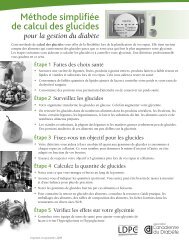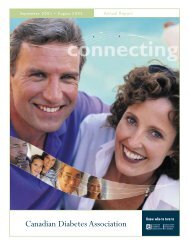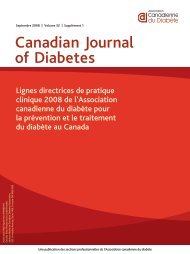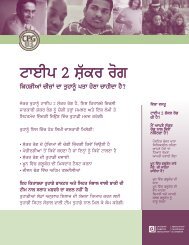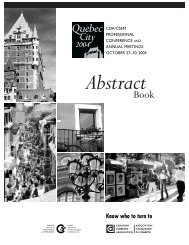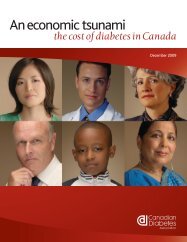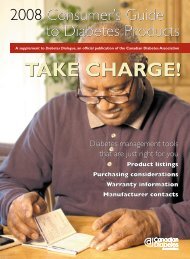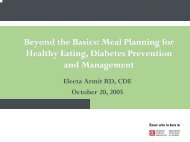2008 Clinical Practice Guidelines - Canadian Diabetes Association
2008 Clinical Practice Guidelines - Canadian Diabetes Association
2008 Clinical Practice Guidelines - Canadian Diabetes Association
Create successful ePaper yourself
Turn your PDF publications into a flip-book with our unique Google optimized e-Paper software.
<strong>2008</strong> CLINICAL PRACTICE GUIDELINES<br />
S8<br />
was a Grade B recommendation (1).<br />
Varying grades of recommendations, therefore, reflect<br />
varying degrees of certainty regarding the strength of inference<br />
that can be drawn from the evidence in support of the<br />
recommendation. Therefore, these evidence-based guidelines<br />
and their graded recommendations are designed to satisfy<br />
2 important needs: 1) the explicit identification of the<br />
best research upon which the recommendation is based, and<br />
an assessment of its scientific relevance and quality (captured<br />
by the assignment of a level of evidence to each citation); and<br />
2) the explicit assignment of strength of the recommendation<br />
based on this evidence (captured by the grade). In this way,<br />
they provide a convenient summary of the evidence to facilitate<br />
clinicians’ task of “weighting” and incorporating everincreasing<br />
evidence into their daily clinical decision-making.<br />
They also facilitate the ability of clinicians, healthcare planners,<br />
healthcare providers and society in general to critically<br />
examine any recommendation and arrive at their own conclusions<br />
regarding its appropriateness.Thus, these guidelines<br />
facilitate their own scrutiny by others according to the same<br />
principles that they use to scrutinize the literature.<br />
It is important to note that the system chosen for grading<br />
recommendations differs from the approach used in<br />
some other guideline documents, such as the one pertaining<br />
to the periodic health examination in Canada, in which<br />
harmful practices were assigned a grade of D (8). In this<br />
<strong>Canadian</strong> <strong>Diabetes</strong> <strong>Association</strong> guidelines document, recommendation<br />
to avoid any harmful practices would be graded<br />
in the same manner as all other recommendations. However,<br />
it should be noted that the authors of these guidelines<br />
focused on clinical practices that were thought to be potentially<br />
beneficial, and did not seek out evidence regarding the<br />
harmfulness of interventions.<br />
EXTERNAL PEER REVIEW AND INDEPEN-<br />
DENT METHODOLOGICAL REVIEW<br />
In July 2007, a draft document was circulated nationally and<br />
internationally for review by numerous stakeholders and<br />
experts in relevant fields.This input was then considered by<br />
the Executive and Steering Committees and revisions were<br />
made accordingly. Subsequently, a panel of 6 methodologists,<br />
who were not directly involved with the initial review and<br />
assessment of the evidence, independently reviewed each<br />
recommendation, its assigned grade and supportive citations.<br />
Based on this review, the wording, assigned level of evidence<br />
and grade of each recommendation were reassessed and<br />
modified as necessary. Revised recommendations were<br />
reviewed and approved by the Executive and Steering<br />
Committees. Selected recommendations were presented at a<br />
public forum at the <strong>Canadian</strong> <strong>Diabetes</strong> <strong>Association</strong>/<strong>Canadian</strong><br />
Society of Endocrinology and Metabolism Professional<br />
Conference and Annual Meetings in Vancouver, British<br />
Columbia, in October 2007.<br />
DISCLOSURE OF DUALITY OF INTEREST<br />
Committee members were volunteers and received no<br />
remuneration or honoraria for their participation. Members<br />
of all committees signed an annual duality of interest form<br />
listing all financial interests or relationships with manufacturer(s)<br />
of any commercial product(s) and/or provider(s) of<br />
commercial services. A full list of committee member disclosures<br />
is available online at http://www.diabetes.ca.<br />
Dualities of interest were also discussed during deliberations<br />
where relevant. In the case of a potential duality or outright<br />
conflict of interest, committee members removed themselves<br />
from discussions. Funding for the development of the<br />
guidelines was provided by the <strong>Canadian</strong> <strong>Diabetes</strong><br />
<strong>Association</strong> and through unrestricted educational grants provided<br />
by the companies listed in the acknowledgements section<br />
(p. x).These companies were not involved in any aspect<br />
of guideline development, literature interpretation, the decision<br />
to publish or any other aspect related to the publication<br />
of these guidelines, and did not have access to guideline<br />
meetings, guideline drafts or committee deliberations.<br />
GUIDELINE UPDATES<br />
A process to update the full guidelines will commence within<br />
5 years. Updates to individual chapters may be published<br />
sooner in the event of significant changes in evidence supporting<br />
the recommendations.<br />
OTHER RELEVANT GUIDELINES<br />
Introduction, p. S1.<br />
ACKNOWLEDGEMENTS<br />
The clinical practice guidelines Expert Committee thanks<br />
the following individuals, who conducted the independent<br />
methodological review:<br />
Gillian Booth MD MSc FRCPC (Chair)<br />
Assistant Professor of Medicine, University of Toronto,<br />
Division of Endocrinology and Metabolism and Li Ka Shing<br />
Institute, St. Michael’s Hospital,Toronto, Ontario<br />
Denice Feig MD MSc FRCPS<br />
Associate Professor of Medicine, University of Toronto,<br />
Toronto, Staff Endocrinologist, Mount Sinai Hospital,<br />
Toronto, Ontario<br />
Dereck Hunt MD MSc FRCPS<br />
Associate Professor, General Internal Medicine/<br />
Endocrinology, McMaster University, Hamilton, Ontario<br />
Charlotte McDonald MD MSc FRCPS<br />
Assistant Professor, University of Western Ontario, London,<br />
Ontario



